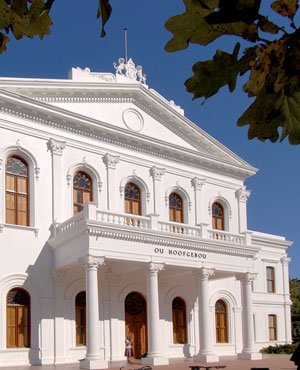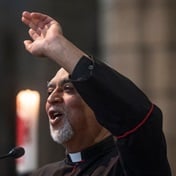
It's a task that universities nationwide have been grappling with: how to "decolonise" their curricula.
While student protests at campuses around South Africa have been calling for "free quality, decolonised education", one university has started taking the first steps towards breaking down the notion that Western knowledge is superior.
At the University of Stellenbosch (Maties), a curriculum renewal project will lead to the "decolonising" of at least 10 academic programmes, including medicine and law. Meanwhile, at the University of Johannesburg, a compulsory online module, African Insights, has been instituted for all first-year undergraduate students to introduce them to the reflections and writings of African thought leaders. This will be supplemented by seminars and other opportunities.
But what does decolonising education mean exactly and how can it be done? Here's how Stellenbosch University is taking on the task:
What does Maties actually mean by decolonisation?
Maties understands decolonisation as removing the notion that content or knowledge of colonising countries (especially European/Western countries) is superior to that of colonised countries and communities.
Does that mean they are going to throw out all 'colonial' knowledge?
"It is not chucking out everything that has been working well and replacing it with something else," emphasises vice-rector for learning and teaching, Professor Arnold Schoonwinkel. He says the approach of excluding content from colonising countries and replacing it with local content and knowledge is one of a few approaches to decolonisation which is discussed and interrogated in a book by public intellectual, Professor Jonathan Jansen.
The university's approach, however, is to supplement the knowledge, research and perspectives from Western countries with those from South Africa and Africa.
Stellenbosch students would thus have prescribed learning material from local and regional sources for study, analysis, discussion and assessment purposes – alongside international academic sources.
"I really believe in the output of South African researchers and the relevance of their work," says Schoonwinkel. "It's about looking at the big picture, looking at local and international, rather than throwing out."
This global approach includes considering content from the Middle East, Far East and South America, he says.
The university wants students to interrogate academic material from multiple sources, measure it up comparatively and substantiate their own findings with analysis and/or empirical research.
Schoonwinkel says their most important task is to enable students to think critically and apply what they know in context.
What sparked academic decolonisation at Maties?
The university's council in November 2016 tasked management with looking into the issue of decolonising the curriculum and making recommendations on how the university should respond. The university evaluates its academic programmes on a continuous basis. It has identified curriculum renewal, which includes decolonisation, as a strategic priority. Renewal includes other aspects such as social impact and transformation, eliminating unnecessary duplication of content and blending face-to-face and online activities. The process is being led by Schoonwinkel.
He tells News24 that they had an international specialist on programme design visit in May last year to look at the overall learning outcomes that students should achieve to be employable and how different modules stack up to achieve these outcomes. The university's 10 faculties were invited to identify at least one programme for immediate renewal and drafted a roadmap for other programmes to follow.
Which programmes will be affected?
• Conservation ecology (AgriSciences faculty)
• BA Language and Culture (Arts and Social Sciences faculty)
• BComm Mathematical Sciences (Economic and Management Sciences faculty)
• MPhil in Higher Education (Education faculty)
• Aspects of the BEng programmes (Engineering faculty)
• The LLB programme (Law faculty)
• The MBChB programme (Medicine and Health Sciences faculty)
• BMil Technology (Military Science faculty)
• BSc Earth Sciences (Science faculty)
• BDiv programme (Theology faculty)
How long will this take?
It will take around two years for the 10 programmes to be extensively renewed. Schoonwinkel says some new modules will already take effect next year. "We want to offer them (the programmes) in a fresh and exciting way that the students will find of even more value," he says.
But how do you decolonise medicine and law?
Renewing the medical and law programmes, including the decolonisation aspect, is "quite a major exercise" because of the vast content, says Schoonwinkel. The medical programme is five years of academics and two years clinical experience, while law is a four-year programme.
With medicine, the university is thinking about what background a doctor will need to be effective and valuable in South African society. Decolonisation will bring in learning material, case studies and experiences in local hospitals so students understand the practice of medicine in the local and African context.
"At the same time, we are making sure they are on par with medical students trained anywhere else. I don't think they will throw out all the good content we [already have] in the programme," says Schoonwinkel.
The university recognises that decolonisation is a complex issue and that ongoing interaction must take place between students, staff, support staff, academics and members of council.




 Publications
Publications
 Partners
Partners






















